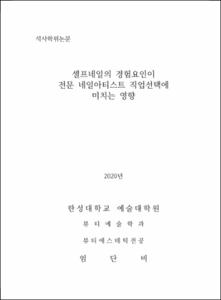셀프네일의 경험요인이 전문 네일아티스트 직업선택에 미치는 영향
= The Effect of Self-Nail Experience on Professional Nail Artist Career Choice
- Files in This Item:
-
-
Download
 200000337279.pdf
기타 데이터 / 784.71 kB / Adobe PDF
200000337279.pdf
기타 데이터 / 784.71 kB / Adobe PDF
-
Items in Repository are protected by copyright, with all rights reserved, unless otherwise indicated.